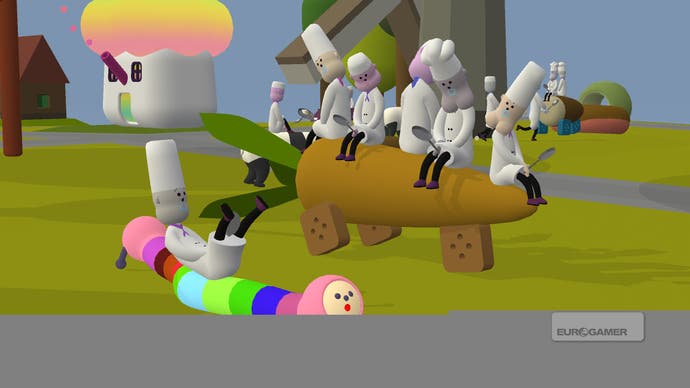Games of 2009: Noby Noby Boy
Stretching a point.
"I believe that it is alright to create a stupid and irresponsible game, I really do."
That's my favourite quote of 2009. It comes from the second interview I did with Keita Takahashi, the endearingly loopy creator of Katamari Damacy, about his odd little PS3 download game, Noby Noby Boy. In fact, Takahashi uttered all my favourite quotes of 2009 (some more of those later), and Noby Noby Boy furnished my single favourite gaming experience of the year too, despite barely being a game at all.
But those aren't the reasons this morsel of dadaist interactive anarchy is my favourite game of the year. Above all, I love Noby Noby Boy for what it stands for. I love it for standing for anything at all. This stupid and irresponsible game, and the wilfully stupid and irresponsible man behind it, secretly had a deadly serious point to make about what videogames are and where they are going - and the contrast with what the rest of the industry got up to in 2009 could not have been sharper.
Back in February, I sat in a cavernous, empty conference room on a business park somewhere on the outskirts of Paris, and played Noby Noby Boy for several hours for our review. I was completely entranced.

I often wonder whether my relationship with Noby Noby Boy would have been different if I hadn't been reviewing it, or even if I'd been reviewing it at home, in less abstracted surroundings, with more distractions around me. I know a lot of people who downloaded it, played it for five minutes and then gave up, failing to see the point. I don't blame them - because Noby Noby Boy has no point.
Or rather, it has no goal. It sets you no challenges, at least not directly, and offers no obstacles for you to overcome. It just gives you a plaything - BOY, a silly little quadruped with two independently mobile ends and a floppy snake of a body that can stretch to infinite length - and a playground, in the form of randomly-generated plots of land dotted with strange animals, people, machines and structures. That's it. As far as having fun is concerned, you're on your own.
It's disconcerting. As grown-up gamers, we're very used to throwing the term "sandbox" around, but we're not used to being confronted with one. We need targets. We need challenges. We need a job to do. We've forgotten what it's like to sit down with a toy and make up our own games and our own stories, even though it's something we all did as children and a vital part of what makes us human. We're so bound up in playing games that we've forgotten how to just play.
Keita Takahashi wanted to remind us. He'd been depressed by the formulaic objectives in the otherwise free-spirited Katamari, he told the audience in his memorable Game Developers Conference session in March. "Of course there are games that absorb these things and result in something wonderful," he said. "But I wanted to throw these off and start from scratch with what games should be." There are many who would debate that this is what games should be, or at least the definition of the word game as he uses it, and they'd have a point - but if nothing else, his willingness to fly in the face of all received wisdom about game design was thrilling.
And, on me at least, it worked. On that day in February, with nothing to do for hours but fool around with Takahashi's ridiculous digital noodle, I remembered - slowly, but with a deepening joy - how to play. I explored the possibilities of the deceptively deep range of interactions, of the wild, skittering inertia of the controls.



